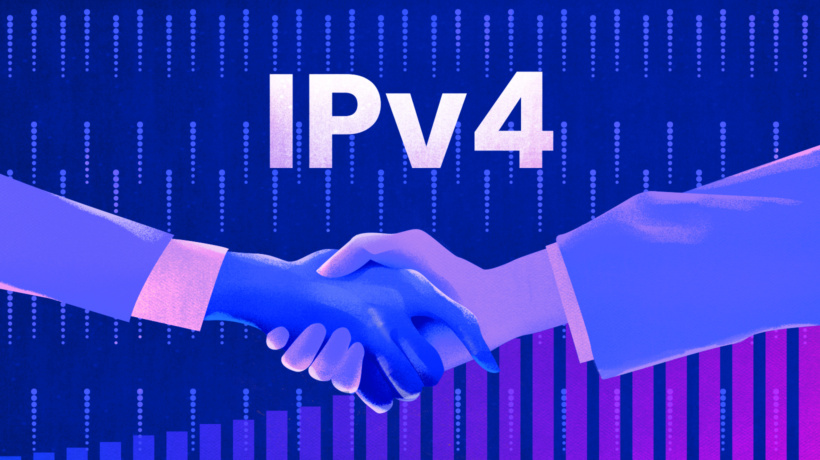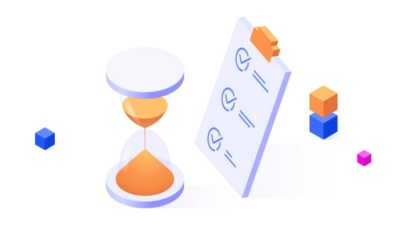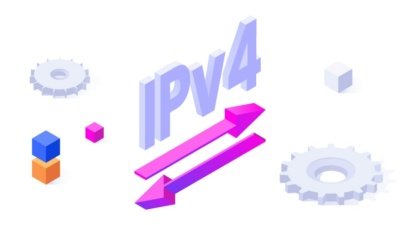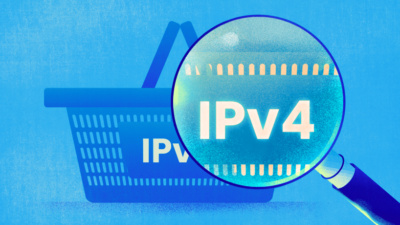Selling IPv4 Addresses? Here Are 3 Things To Consider First
IPv4 addresses have become a great asset in 2023. Do you want to sell IPv4 blocks? Here are a few things to consider first.

Unused Internet Protocol version 4 (IPv4) addresses are a proven asset, but not all companies who own IPs realize this. In many cases, IP holders who recognize the potential of this desirable commodity are quick to sell IPv4 address blocks without realizing that that is not the only option and, perhaps, not even the best one.
If you are interested in selling IPv4 addresses because you want to cash in and use the retrieved money for your business growth, you definitely should consider the many benefits of IP leasing. Specifically, retaining ownership and securing recurring revenue. Even if you are more interested in selling unused IPs because you do not want to be responsible for handling the assets you own, IP leasing can offer a great solution.
Without a doubt, there are a few things to consider before selling IPv4 addresses. And if you are curious, keep reading to learn all you need to know before you begin the transfer process.
Key takeaways
- IPv4 addresses have become a valued commodity because, although they have been exhausted, the demand is still high.
- Due to increasing demand and diminishing supply, IPv4 prices have climbed significantly over the past few years, and IP holders have the perfect opportunity to monetize their assets.
- Although selling IPv4 is an option for IP holders, there are many advantages to IP leasing that should be considered by anyone interested in selling their assets.
Why is there a demand for IPv4 addresses?
When the Defense Advanced Research Projects Agency (DARPA) introduced IPv4 in 1981, the engineers believed that 4.29 billion IP addresses would be enough to support the online world. However, the number of internet-connected devices and networks exploded in the 1990s, resulting in the rapid exhaustion of IPv4 addresses.
Also, while Internet Protocol version 6 (IPv6) addresses should have offered a solution to the scarcity of IPv4 addresses, the new version has not offered much relief so far. This is not surprising as technical limitations and huge implementation costs still limit wide-scale IPv6 adoption.
So, how can a business acquire IPv4 blocks needed for its growing network? The high demand for IPv4 addresses influenced the rise of the secondary market, in which IP brokers, or IP traders, support the IPv4 address sale process.
In other words, a reputable broker finds potential buyers and helps companies sell IPv4 addresses at the best market price in a transparent way, without hidden fees or obscure conditions. Simultaneously, an IPv4 broker ensures that IP buyers can promptly purchase a large or small block of IPs.
Undeniably, brokers are versed in Regional Internet Registry (RIR) policies and know how to buy and sell IPv4 addresses. Among companies they have assisted in selling IPs, we can see the Massachusetts Institute of Technology (MIT), Northern Telecom, AT&T, Hewlett-Packard, Vodafone, Kodak and many others.
What should you consider before selling IPs?
If your company wishes to sell IPv4 addresses, there are a few aspects to consider beforehand. Let’s discuss the three most important pain points.
Price of IP addresses
Naturally, the rising demand for IP addresses forces IPv4 prices to go up as well. While this may seem beneficial for the potential seller, it might be challenging to find buyers willing to invest a lot of money for a full block of IPs. Even if that is a small block.
Let’s say you find a buyer who would like to buy your /24 block, which contains 256 IPs, at the average price of $50 per IP. The buyer would have to pay $12,800 to purchase the block. This may be a large amount for a startup or smaller businesses that need IPs and do not want to invest a lot of money upfront. Ultimately, if the prices per IP continue to rise, businesses that need IPs may start looking for alternatives.
Amount of IPs / Subnet
Buying price
(Upfront payment)
$11,520.00
Leasing price
(Recurring)
$145.92
In the worst-case scenario, you may be unable to sell your unused assets for a long time. As a result, you might need to manage a dormant IP block, which requires additional resources – expertise, time and money.
Regional Internet Registries’ policies and the transfer process
Another drawback to selling IP addresses is the long and complicated IP transfer process. Why? For one, communication with each Regional Internet Registry may not be smooth if they fail to promptly respond to an IP holder’s requests. Therefore, the transfer may take from several weeks to maybe even several months.
Moreover, IP holders with unused IPv4 blocks need to know all the transfer procedures and requirements imposed by each internet registry. Consequently, sellers may need more time to familiarize themselves with different and complicated internet registry policies, further dragging out the timeline.
Of course, IP sellers can use the services of an approved IPv4 broker that assists in the entire process: From finding buyers to communicating with the relevant internet registry to managing every payment and transaction. Furthermore, IP brokers can assist with IPv4 address transfer documentation; for example, drafting an asset purchase agreement or other tailored contracts.
You might be able to transfer IPv4 addresses yourself without a middleman, but it might be difficult to find suitable buyers. Not to mention that you must take care of the entire transaction, including the transfer-related paperwork, which may be an extremely time-consuming process.
Lost rights to IP resources
Not all IP holders wishing to sell IPv4 addresses realize that when they sell their intangible assets, they give away a highly valuable commodity. Why? IPv4 addresses are still in high demand, which a low supply cannot support.
RIRs no longer allocate IPs freely to just any company that requires them, so if you sell IPv4 blocks and find yourself needing the resources again, you are likely to need to spend a lot of money. And again, the purchase process takes a long time. Plus, if you don’t want to coordinate the transaction yourself, you would need to find a broker to assist you with finding the right seller, arranging all the documentation and finalizing the payment.
If you consider all of this, you might decide you want to hold onto your resources, regardless of whether you are holding small or large blocks of IPs. But what should you do with an unused resource that demands care and protection? Fortunately, you can still put those assets to use without trading them.
Are there any alternatives to selling IPs?
Did you know you don’t need to sell IPv4 address space to monetize it successfully? You can generate additional funds for your company and support the growth of others by repurposing your IPv4 blocks. How? IP leasing is the answer.
Join the IPXO Marketplace – the first fully-automated IP lease and monetization platform. Our IP address market is an innovative solution to the scarcity of IPv4 addresses. We assist clients from different industries worldwide to lease and monetize their unused resources and contribute to the more sustainable use of IPv4 addresses.
Compared to transferring IPv4 blocks and selling your assets, IP leasing is a more straightforward process and takes just a few days. After registering at IPXO and uploading your subnets, you can start monetizing and receiving additional revenue for your company almost immediately.
The greatest benefit of joining the IPXO Marketplace is that you can set your own prices and secure a recurring income. Whereas if you decide to sell IPv4, you will only receive a one-time payment. Therefore, even if you decide to sell your assets eventually, it’s absolutely more profitable to lease them in the meantime.
In most cases, you don’t need to communicate with Regional Internet Registries to lease an IP block and receive additional funds. And you can use the funds acquired from IP monetization to invest and expand your business in other areas.
Furthermore, if you lease your IPv4 blocks, you no longer need to worry about the management side. Our dedicated Abuse Prevention team works hard to mitigate IP abuse, ensure abuse observability and support clients in other ways through speedy online communication.
All these amazing benefits amount to a full-service IP monetization experience. Please note that once subnets are monetized, we apply a standard 5% platform fee for IP holders. This fee is deducted monthly from earned revenue, which means you start paying only once you start getting paid.
Reap the benefits of IPv4 monetization
Due to the scarcity of IPv4 addresses, these resources have become an intangible commodity. The increased need for IPs and a short supply gave way to the secondary market, in which IP traders assist and help buy or sell IPv4 address blocks.
But did you know that IP leasing is a great alternative that can help repurpose unused resources and unlock a new source of income? Leasing via the IPXO Marketplace allows companies to quickly monetize their additional IPv4 address blocks while empowering other businesses to scale their networks.
If you lease your IP block at IPXO, you don’t need to search for potential clients – IP lessees – yourself. Also, if you lease your IPv4 address blocks, you remain the holder of your intangible assets with the right to withdraw the resources and use them yourself should the need arise.
Register at IPXO, start leasing and wait for your first payout. If you are still unsure whether to lease or sell IP addresses, book a demo to see our platform in action. We will answer all questions and show how we can help your business lease IPv4 blocks.
Your #1 IP monetization platform
Fully automated. Fully accessible. Fully supported.
FAQ about selling IPv4 addresses
IP holders who have been allocated IP addresses by Regional Internet Registries can transfer the ownership rights to other entities. The transfer process is time-consuming, costly and requires signing an asset purchase agreement, among other documents. Most IP holders choose the services of IP brokers to facilitate the address sales process. One thing to note is that once the sale is finalized and the payment is complete, the resources can no longer be monetized. On the other hand, if the IP holder leases unused resources, they can secure recurring income.
IP sale: IPv4 prices have increased significantly in the last few years, which is why the resource is considered to be a commodity. Today, you can sell IPv4 at around $45-$50 per IP on average; however, sales of $60 per IP have been reported as well. Ultimately, IPs are worth as much as potential buyers are willing to pay, and that is why IP address brokers are often hired to both find buyers and negotiate the best deals for the IPv4 blocks on sale.
IP lease: If we look at the IPv4 price from the leasing perspective, a single IPv4 address can be monetized for around $0.50 per IP address per month. That means more money can be earned by leasing the same resource in under a year. Moreover, the lease time is unlimited, providing an unlimited time frame for continuous monetization.
IPv4 addresses are highly desirable because they are crucial for smooth communication between internet-connected devices. Since IPv4 supply is virtually exhausted, the remaining unused resources have become a tradable commodity. If you were to sell IPv4 address blocks, you would have to rely on finding the highest bidder, and if you were to lease – all you have to do is set the desired price and then collect the earnings.
In theory, no one owns IP addresses, and when an IP holder sells their assets to an IP buyer, they are simply transferring their rights to use the resources. That said, the rightful IP holder is the one who can sell IPv4, monetize through leasing or use the resources on their own network.
In the past, IP holders with unused IP resources often chose to sell IPv4, but that is no longer the preferred option. The IP sales process is often lengthy and complicated, but what is most important is that the holder loses their rights to the resource. That is because to sell IP addresses means to give up ownership rights. On the other hand, those who choose to lease their IPs do not need to lose rights to the resources through a sales process, and they do not need to worry about finding a broker or a buyer. Through IP lease, our clients can monetize their IPs repeatedly, securing a substantially bigger profit in the long run (less than a year).
About the author
Table of contents
Key takeaways
Why is there a demand for IPv4 addresses?
What should you consider before selling IPs?
Price of IP addresses
Regional Internet Registries’ policies and the transfer process
Lost rights to IP resources
Are there any alternatives to selling IPs?
Reap the benefits of IPv4 monetization
FAQ about selling IPv4 addresses
Related reading

IPv4 Waiting List Explained
What is an IPv4 waiting list? How does it work and who operates it? Is there a way to get IP resources without joining a waiting list? Uncover all…
Read more
IPv4 Transfer Market: How Does It Work and Is There an Alternative?
Uncover the ins and outs of the IPv4 transfer market, how it operates in different regions and what the best alternative to transferring IPv4 addresses is.
Read more
Buying IPv4 Addresses: Is It the Best Option for Growing Companies?
Have you faced IPv4 exhaustion? Do you believe you must buy IPv4 address space? Discover why you should consider IP lease as the alternative.
Read moreSubscribe to the IPXO email and don’t miss any news!
